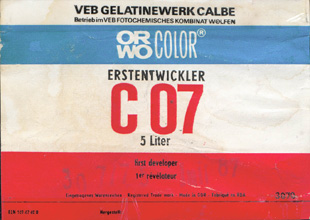Les soviets plus l'électricité
Sowjetmacht plus Elektrifizierung
The Soviets plus Electricity
Nicolas Rey
Frankreich 2001 |
| |
|
 |
|
|
Arsenal 1
07.02., 13.30
Delphi
09.02., 13.00
CinemaxX 3
10.02., 12.30
Babylon
11.02., 18.30
|
|
|
|
|
Produktion: L’Abominable, Paris
Weltvertrieb: Light Cone
12, rue des Vignoles, 75020 Paris
Tel.: (33-1) 46 59 01 53
e-mail: lightcone@club-internet.fr
Kamera, Schnitt, Ton: Nicolas Rey
Format: 16 mm, Farbe
Länge: 175 Minuten, 24 Bilder/Sek.
Sprache: französisch, russisch |
|
|
|
|
Eine Kinoreise in drei Etappen quer durch Russland bis nach
Magadan (Sibirien), jener fernen, legendären Stadt in der ehemaligen
Sowjetunion, die 1941 gegründet wurde, damit Arbeitskräfte
des Gulags von hier die Goldminen der Region ausbeuten konnten.
Ausgehend von Fragmenten seines akustischen Tagebuchs, dokumentarischen
Aufnahmen und einigen unterwegs gewonnenen
autobiografischen Erkenntnissen, versucht Nicolas Rey seiner imaginierten
Herkunft auf den Grund zu gehen.
Nicolas Rey: „Für den größten Teil der Reise ist
die Zeit des Films
‘aus den Fugen’, wie Shakespeare sagt, und der Zuschauer
kommt, genau wie der Filmreisende, nur im Wechselschritt voran.
Es liegt an ihm, die Leerstellen oder vielmehr die Tunnel auszufüllen,
ich verschanze mich hinter der Rolle des Regisseurs.
Warum ihm also nicht einen Großteil der Arbeit anvertrauen? U-so
besser, wenn das den Film irritierend macht…
Vom Zeitpunkt der Abreise an fordert mein Film vom Zuschauer,
mit mir bis ans Ende der Welt zu fahren. Das ist viel verlangt:
Immerhin weiß man nicht, was kommt. Ich bin mir dessen bewusst
und will wohl glauben, dass mehr als einer sich davon abschrecken
lassen wird. Aber jene, die das Spiel des Films mitspielen wollen,
die Hartnäckigsten, werden durch Wahrnehmungen belohnt,
die, so hoffe ich, neu für sie sind. Dafür werden keine wirklichen
Vorkenntnisse vorausgesetzt, sondern nur der Wunsch, Augen und
Ohren ohne jegliche Vorurteile zu benutzen.“
|
| |
|
|
Les soviets plus l’électricité is a cinematic
journey in three stages straight
through Russia to Magadan in Siberia, that
faraway and legendary city of the former
Soviet Union. Based on excerpts from his
acoustic diary, documentary footage and
some autobiographical insights gained on
the way, the roving reporter searches for
the roots of his imaginary, ideal past.
Nicolas Rey: “The rest of the time the film
is, as Shakespeare says, ‘off its hinges,’ and
the viewer progresses – just like the traveller
himself – in stops-and-starts. It is up
to the viewer to fill in the gaps, or rather
the tunnels. I take refuge in the role of the
director, as Dziga Vertov defines it etymologically
at the start of The Man with the
Movie Camera: The viewer completes the
film, the viewer the image, and that is
nothing new. Why not also make him do the
bulk of the work? If, as a result, the film is
annoying and ‘causes trouble’, as they say,
so much the better.
From the very outset, my film challenges
the viewer to travel to the ends of the
Earth with me. That’s asking a lot. After all,
you don’t know what might happen. I’m
aware of that and am prepared to believe
that some people will be put off by it. But
the most persistent of you, those who are
prepared to play along with the film, will
be rewarded with sensations that will, I
hope, be new to you. You don’t require any
prior knowledge for this, merely the willingness
to use your eyes and ears without
prejudice of any kind.“
|
| |
|
Biographien / Biographies
Nicolas Rey, geb. 1968. Seit 1993 Filme, die zwischen Fotografie, Dokumentar-
und Experimentalfilm angesiedelt sind, u.a.Postier de nuit (1995), Opera
mundi (performance promenade, triple projection, 1999).
|
